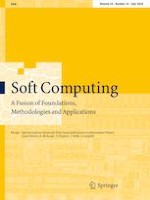14.06.2019 | Focus
Explaining versus describing human decisions: Hilbert space structures in decision theory
Erschienen in: Soft Computing | Ausgabe 14/2020
EinloggenAktivieren Sie unsere intelligente Suche, um passende Fachinhalte oder Patente zu finden.
Wählen Sie Textabschnitte aus um mit Künstlicher Intelligenz passenden Patente zu finden. powered by
Markieren Sie Textabschnitte, um KI-gestützt weitere passende Inhalte zu finden. powered by
